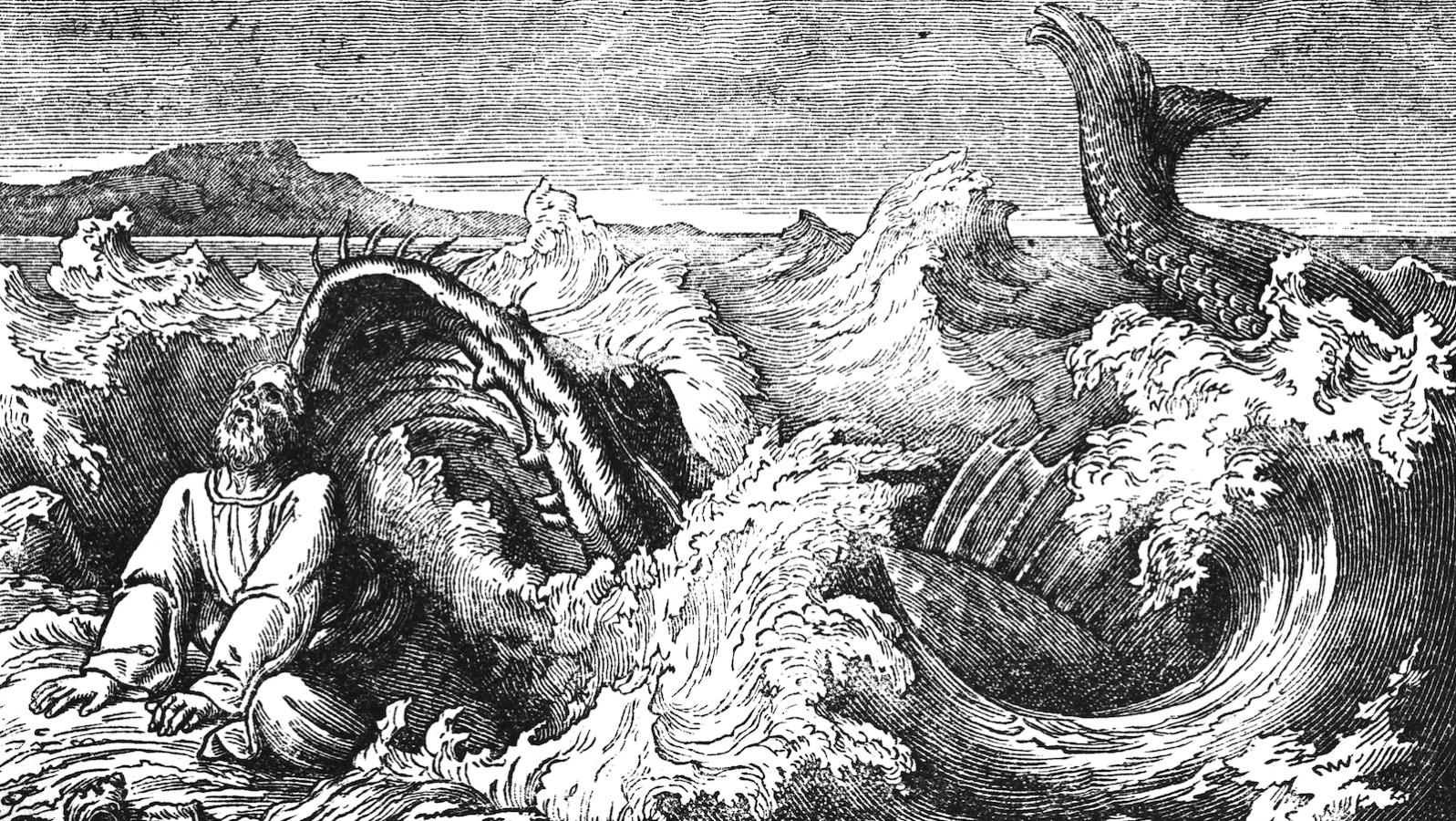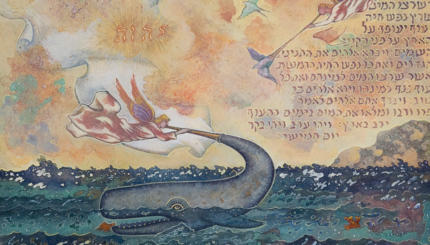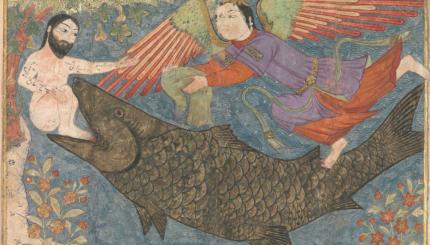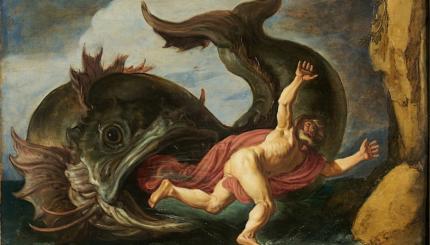It is particularly difficult to identify the central theme that unites all the elements of the story (in the Book of Jonah) into a literary and conceptual whole. The broad variety of opinions on this subject —from the talmudic sages through modem commentaries —can be subsumed under four basic headings.
Each offers its own answer to the three interrelated questions: Why was Jonah unwilling to prophesy against Nineveh? What did the Lord teach His prophet by means of the tempest, the fish and the gourd? What are readers supposed to learn from the book?
Atonement Versus Repentance
The designation of Jonah as the Haftarah (prophetic reading) for the afternoon service of Yom Kippur (Talmud Bavli Megillah 31a) reflects the view that this book depicts the concept of repentance so starkly and completely that it can stir hearers to repent of their ways and even modify their conduct.
The Ninivites’ repentance does indeed seem to be an exemplary combination of fasting, prayer, and deeds (abandoning their evil ways), just as its acceptance by the merciful God is tantamount to a guarantee and confirmation that authentic repentance has the power to nullify the fatal decree.
Were repentance the thread that unites the book, we could expect that all its episodes would relate to it, in some fashion or other. Yet only chapter 3 deals with this theme. Unlike the people of Nineveh, the sailors are not described as transgressors. Consequently their submission to the will of the Lord and their great reverence for Him do not constitute a turning back from sin.
Jonah does indeed sin, but his prayer from the belly of the fish is quite devoid of contrition, while his silence at the end of the book leaves the extent of his change outside the narrative.
The incident of the plant and the Lord’s reply to Jonah (4:6‑11) clearly relate to quite a different subject: Nineveh merits its Creator’s protection not because of its citizens’ remorse, but because it is a great metropolis, teeming with children who have never sinned, and many beasts as well.
Universalism Versus Particularism
The second view is that Jonah preferred loyalty to his people Israel over his duty to obey the Lord of the universe, his master. For this approach, the key to the story is that it is set exclusively among gentiles, who are presented in a positive light. Against this background, the Hebrew prophet’s refusal to go to Nineveh is explained by his fear that the anticipated repentance of the gentile city will cast a heavy shadow on the stiff‑necked Israelites.
In the modem scholarly version of this exegesis, the Book of Jonah is described as a polemic against the narrow exclusivism prevalent among the returnees to Zion that resulted from the travails of the destruction of the First Temple, the exile and Persian domination.
According to this position, the election of Israel requires the Jews to turn away from members of other nations and even justifies disdain for them. Jonah is accordingly taken as the representative of this antipathy toward gentiles, and his flight is explained as a refusal to show them the way to repentance and salvation.
The forceful blocking of his flight, by contrast, is meant to point us toward the true meaning of election: Israel was chosen to serve as the carrier of faith in order to disseminate it among all nations. To demonstrate that this awesome mission can be realized, the humble spirit and open heart of the gentiles aboard the ship and in Nineveh are juxtaposed with the arrogance of the prophet who rejects his mission.
This universalist view, too, cannot be anchored in the text of Jonah, unless one can show that the prophet is characterized as the embodiment of such Israelite exclusivism, whereas the sailors and people of Nineveh are cast as faithful representatives of the pagan gentile world and its openness to the call of faith. Jonah’s anger at the pardon extended to Nineveh might be taken as an indication that he is a xenophobe who longs for the destruction of idolaters.
But this explanation is refuted by his conduct during the storm: instead of trying to force his pursuer to drown all those aboard the ship on account of his own transgression, he acts to prevent their being dragged into his quarrel with his God. In view of the absence of any manifestation of hatred for gentiles and idolatry (the book contains no condemnation of the sin of idolatry), it is impossible to interpret his self‑stated reasons for running away (Jonah 4:2) as a protest against the display of divine mercy toward idolaters.
Prophecy: Realization Versus Compliance
The third reading, which focuses on Jonah’s stubborn refusal to prophesy against Nineveh and his anger at its deliverance, grounds the story on Jonah’s jealous concern for the veracity of prophecy and his apprehension lest his credibility be undermined.
According to this view ‑- which was adopted by (many earlier scholars including) Saadiah Gaon (Beliefs and Opinions 3, 5), Rashi, David Kimhi (who combined it with the second theme reviewed above), Abravanel, and many modem scholars — the Book of Jonah seeks to teach us about the educational purpose of prophecies of doom (see Ezekiel 3: 16‑21 and Ezekiel 33:1‑9) through the medium of a story that criticizes a prophet who viewed announcing future events as his role and full realization of the prophecy as his only test.
Jonah runs away because he cannot resolve two contradictions: between the categorization of prophecies that do not come to pass as “false prophecies” (Deuteronomy 18:21-22) and the revocation of the verdict against Nineveh, in response to its repentance; and between the concept of God as unchanging and resolute (see Numbers 23:19) and His attributes of compassion and forgiveness.
Nevertheless the Lord compelled him to prophesy against Nineveh to teach him the paradoxical nature of true prophets, who “foretell punishment to make it unnecessary” (St. Jerome in his commentary on Ezekiel 33:1).
Such a definition of the prophet’s role is undoubtedly an appropriate and weighty theme for a prophetic narrative, but there is no real sign in the Book of Jonah of the prophet’s anguish that his prediction did not come to pass, nor anything like this elsewhere in the Bible. This is why the author of the Midrash quoted above had to assume that Jonah had previously been mocked by the people of Jerusalem.
Compassion: Justice Versus Mercy
The fourth view is that Jonah argues on behalf of strict justice — against the merciful God, who repents of His sentence (upon the Ninevites). To the advocate of strict justice it is clear that wickedness abounds not only because of the viciousness of evildoers, but also because the Judge of all the earth does not treat them with the full severity of the law.
He (Jonah) must learn that the world can exist only through the unfathomable amalgam of justice and mercy, that fear of sin is produced not only by fear of punishment, but also by awe at the sublimity of salvation (“The men feared the LORD greatly” [1: 16]; see Kings 17:24) and by fascination with grace and absolution (“Yours is the power to forgive so that You may be held in awe” [Psalm 130:41).
Jonah foresaw both the submission of the evildoers of Nineveh, terrified by their impending destruction, and the acceptance of their repentance by the merciful God; but he was totally wrong to believe that he would be allowed to escape to Tarshish. Subsequent surprises undermine his pretense to knowledge‑-the fish that saves him from death but imprisons him in its belly until he gives up his flight and begins to pray; and the plant that saves him from his distress but vanishes as suddenly as it appeared, so that he can feel the pain of loss and open his heart to understand the Creator’s love for His creatures.
Jonah Must Realize His Own Need for Mercy
Only when the proponent of strict justice realizes his own humanity can he understand the fundamental dependence of mortals on human and divine mercy. The midrashic sages had Jonah express this recognition, in body language and words, in the answer they report he gave to the Lord’s rhetorical question that concludes the book:
Then he fell on his face and said: “Conduct Your world according to the attribute of mercy, as it is written: ‘To the LORD our God belong mercy and forgiveness’ (Daniel 9:9)” (Midrash Jonah).
The reservations offered against the first three views do not apply to this last. The chief reason is that it is the only one that does not focus on a particular segment of the story; rather, it is compatible with the entire narrative from beginning to end and encompasses most of its elements.
The vast majority of commentators and students of the Book of Jonah still adhere to one of the first three readings or some combination thereof (see David Kimhi on 1:1). Our interpretation, however, explains the plot, the characters, and the dialogue as embodying the primordial struggle between justice and mercy.
Excerpted with permission from The JPS Biblical Commentary: Jonah (Jewish Publication Society).
Midrash
Pronounced: MIDD-rash, Origin: Hebrew, the process of interpretation by which the rabbis filled in “gaps” found in the Torah.
Talmud
Pronounced: TALL-mud, Origin: Hebrew, the set of teachings and commentaries on the Torah that form the basis for Jewish law. Comprised of the Mishnah and the Gemara, it contains the opinions of thousands of rabbis from different periods in Jewish history.



